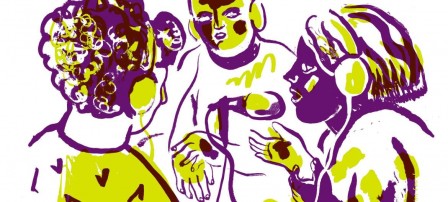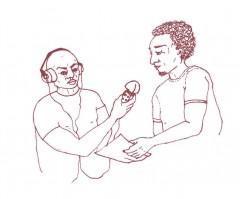mercredi, septembre 25 2019
Par Karine Gatelier le mercredi, septembre 25 2019, 11:42
Les Rencontres Cinéma et migrations, du 25 au 29 septembre, à Lyon sont l'occasion pour l'atelier radio de Modop de présenter son documentaire sonore "Les mots des autres".
C'est au cinéma L'Elysée, 14 rue Basse Combalot (quartier de la Guillotière) à Lyon, vendredi 27 septembre à 16h.
Lire la suite...
jeudi, juillet 18 2019
Par serena le jeudi, juillet 18 2019, 17:53
 Modus Operandi a été invité à l'Université Internationale de la Paix de Sant Cugat del Valles, à proximité de Barcelone, dans le cadre de leur cours d'été de 2019 intitulé "Frontières: perméabilité pour les armes et les capitaux, murs pour les personnes."
Modus Operandi a été invité à l'Université Internationale de la Paix de Sant Cugat del Valles, à proximité de Barcelone, dans le cadre de leur cours d'été de 2019 intitulé "Frontières: perméabilité pour les armes et les capitaux, murs pour les personnes."
Lire la suite...
jeudi, juin 13 2019
Par serena le jeudi, juin 13 2019, 13:24

Jeudi 20 juin -Salle noire - Prix libre
Le Réseau Traces, le festival Écoute(s) et Modus Operandi organisent une soirée d'écoute et d'échange autour de créations et documentaires radiophoniques. Cet événement consacré au lien entre radio et migration pour objectif de réunir différents projets radiophoniques de la région.
Lire la suite...
mardi, juin 11 2019
Par Karine Gatelier le mardi, juin 11 2019, 10:23 - Actualités / Conflict update
Diversité sociale dans les organisations de l'ESS : un objectif à poursuivre pour construire une autre société ?
Peut-on imaginer une ESS qui soit un lieu de rencontre et de construction collective entre des personnes issues de toutes les catégories sociales ? Doit-on en rêver, en faire un objectif?
Quel discours et quels actes peuvent permettre cela ? La non mixité est-elle par ailleurs intéressante pour permettre l'émancipation de certain.es ?
Avec la participation de l'Accorderie, l'Elefan, Modus Operandi, Cuisine sans frontières
Lire la suite...
mercredi, avril 3 2019
Par serena le mercredi, avril 3 2019, 18:43
 Au mois de novembre et décembre 2018, la journaliste Clémentine Méténier est venue assister aux ateliers radio dans le but de faire un reportage sur l'utilisation de l'outil radiophonique pour la Radio Télévision Belge Francophone.
Au mois de novembre et décembre 2018, la journaliste Clémentine Méténier est venue assister aux ateliers radio dans le but de faire un reportage sur l'utilisation de l'outil radiophonique pour la Radio Télévision Belge Francophone.
Lire la suite...
mardi, mars 5 2019
Par Claske Dijkema le mardi, mars 5 2019, 10:32
(Non)Violence !
Du 4 au 16 mars 2019, dans l'agglomération grenobloise
Co-organisées avec PACTE
Pour les 4e Rencontres de géopolitique critique nous vous proposons d'interroger la nature des violences à l’œuvre dans notre société, avec la question notamment "qui est violent ?".
A cette occasion, nous réfléchirons aux modalités d'une action constructive pour se projeter vers un futur désirable.
Pour télécharger une version imprimable du programme, c'est ici.
Lire la suite...
Par marion le mardi, mars 5 2019, 10:31
Mercredi 13 mars 2019 à 19h au Thé à Coudre, 6 Rue Servan
Avec Charles Heller, Mouhamdou Amani, Sarah Bachellerie, Christina des Biaggio, Isabelle Saint Saëns
Lire la suite...
jeudi, février 21 2019
Par marion le jeudi, février 21 2019, 11:40
Jeudi 14 Mars 2019 de 19h à 21h à la Mjc Robert Desnos
Lire la suite...
Par marion le jeudi, février 21 2019, 11:01
Mardi 12 mars de 18h30 à 21h au Thé à coudre
Diffusion Radio Campus Grenoble (90.8)
Interview de François Gemenne, politiste , et Anne-Laure Amilhat Szary, géographe,
par les participant.es de l'atelier radiophoniques des cours de français de l'ADA - Accueil
Demandeurs d'Asile.
Échanges radiophoniques prévus avec le public après les interviews.
Lire la suite...
mercredi, février 20 2019
Par marion le mercredi, février 20 2019, 13:47
Lire la suite...
Par marion le mercredi, février 20 2019, 12:29
Vendredi 08 mars, Antigone, accueil à 18h30
Comment créer le rapport de force dans une lutte ? De quels moyens dispose-t-on ?
A partir d'un partage d'expériences issu de luttes en cours, locales ou non, on propose d'échanger sur les témoignages de chacun dans le public pour faire un état des lieux et tenter de construire des liens.
Lire la suite...
Par marion le mercredi, février 20 2019, 11:35
Avec Ali Babar Kenjah
Essai sur la violence antillaise
René Girard au prisme du discours antillais...
Lire la suite...
Par marion le mercredi, février 20 2019, 11:28
Avec Ali Babar Kenjah
Essai sur la violence antillaise -René Girard au prisme du discours antillais...
Lire la suite...
Par marion le mercredi, février 20 2019, 11:22
Avec Ali Babar Kenjah
Essai sur la violence antillaise -René Girard au prisme du discours antillais...
Lire la suite...
Par marion le mercredi, février 20 2019, 11:07
Avec Ali Babar Kenjah
Essai sur la violence antillaise -René Girard au prisme du discours antillais...
Lire la suite...
Par marion le mercredi, février 20 2019, 10:54
Avec Anaïs Bovet et Erwan Lecoeur
Le lundi 11 mars de 12h à 14h à l'IEP Grenoble, amphi F
Lire la suite...
Lundi, février 18 2019
Par marion le Lundi, février 18 2019, 17:27
un documentaire d'Eugene Nulman, 2016
Lire la suite...
Par marion le Lundi, février 18 2019, 16:26
Violence et non-violence dans l'alimentation
Samedi 16 mars de 10h à 13h30 à la Maison de quartier Louis Aragon
Lire la suite...
Par marion le Lundi, février 18 2019, 15:23
L'accident nucléaire qui suit le tremblement de terre du 11 mars 2011 à Fukushima laisse encore aujourd'hui de vastes régions environnantes dans un état de crise chronique, celui d'une contamination récurrente par la radioactivité.
Lire la suite...
Par marion le Lundi, février 18 2019, 12:38
un documentaire de Christine Bouteiller, 2018
Lire la suite...

 Modus Operandi a été invité à l'Université Internationale de la Paix de Sant Cugat del Valles, à proximité de Barcelone, dans le cadre de leur cours d'été de 2019 intitulé "Frontières: perméabilité pour les armes et les capitaux, murs pour les personnes."
Modus Operandi a été invité à l'Université Internationale de la Paix de Sant Cugat del Valles, à proximité de Barcelone, dans le cadre de leur cours d'été de 2019 intitulé "Frontières: perméabilité pour les armes et les capitaux, murs pour les personnes."
 Au mois de novembre et décembre 2018, la journaliste Clémentine Méténier est venue assister aux ateliers radio dans le but de faire un reportage sur l'utilisation de l'outil radiophonique pour la Radio Télévision Belge Francophone.
Au mois de novembre et décembre 2018, la journaliste Clémentine Méténier est venue assister aux ateliers radio dans le but de faire un reportage sur l'utilisation de l'outil radiophonique pour la Radio Télévision Belge Francophone.